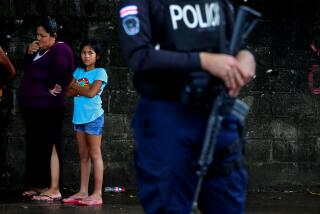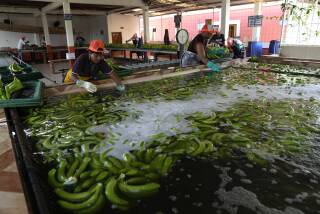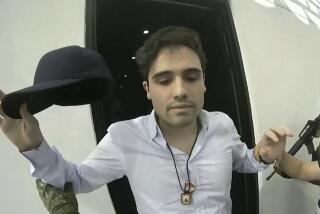Vesco Linked to Cuban Drug Smuggling
- Share via
WASHINGTON — Fugitive financier Robert L. Vesco is collaborating with Cuban and Nicaraguan officials to smuggle narcotics into the United States and Europe, the head of the U.S. Customs Service told a Senate subcommittee Friday.
Customs Commissioner William von Raab said Vesco has worked closely with Frederico Vaughn, a top aide to the Nicaraguan interior minister, and that funds from the drug trade have often been used to purchase automatic weapons for the leftist Sandinista government’s war with the Nicaraguan rebels, or contras.
In testimony before the Senate Labor subcommittee on drugs and alcoholism, Von Raab and John C. Keeney, an official of the Justice Department’s criminal division, said Vesco’s participation in recent drug-smuggling activities has been documented by several intelligence sources, including a government informant and a former trafficker.
Vesco, who fled the United States 13 years ago to avoid facing federal charges of financial fraud and campaign law violations, has become well-known in the Caribbean as “a middle man” in drug and money-laundering operations, Von Raab said. Although Vesco has lived in Costa Rica and the Bahamas, his current address is unknown, the commissioner said.
Cuba’s Role Explained
The Customs Service announced last October that it was investigating charges that Vesco was working with the Nicaraguan government to finance cocaine smuggling into the United States and Europe.
Cuba’s role in the operation has been to provide protection for drug smugglers moving narcotics by ship or plane to the United States in hopes of causing social turmoil, Von Raab testified Friday.
Sen. Paula Hawkins (R-Fla.), chairman of the subcommittee, said Nicaraguan government officials want “to raise the hard cash they need” to defeat the rebels and seek “to destroy American youth and cripple American society by flooding our country with drugs.”
However, Sen. Christopher J. Dodd (D-Conn.) suggested that Hawkins’ accusations are politically motivated and objected to what he called her attempt to single out Nicaraguan officials as primarily responsible for an influx of drugs.
Dodd, an opponent of Reagan Administration efforts to aid the contras, said “the source of the problem” lies primarily with other countries, such as Colombia, Bolivia, Ecuador and Mexico.
Colombian Crackdown
But Von Raab said Colombia recently has taken steps, under U.S. pressure, to root out major cocaine dealers. “I believe that the Colombian government crackdown on narcotics traffickers has forced Colombian traffickers to seek new bases of operation, such as Nicaragua,” he said.
“Our most recent information indicates that major Colombian cocaine traffickers such as Jorge Ochoa and Pablo Escobar have relocated some cocaine labs from Colombia to Nicaragua,” Von Raab said. “This most recent development has the potential of making Nicaragua a significant producer of cocaine in addition to being a drug transit area.”
Von Raab did not estimate the size of Nicaragua’s drug transactions except to say that Vaughn, the Nicaraguan aide, once received $1.5 million from foreign narcotics dealers for providing a protected airfield in Nicaragua used in the transportation of illicit drugs to the United States. He added that Cuba allows narcotics ships to stop at its ports and permits planes to use commercial air corridors over its territory.
The Nicaraguan Embassy in Washington issued a statement Friday denying, as it has in the past, all charges of government involvement in the drug trade. “We consider it one more try of the Reagan Administration to discredit the government of Nicaragua,” the statement said.
But James Herring, a former drug trafficker, told the subcommittee that Vesco and his associates were protected by the Nicaraguan and Cuban governments. In one instance, Herring said, he had sailed to Cuba on a freighter that was met by a Cuban gunboat carrying Vesco. The freighter, he added, brought high-technology equipment to Cuba and picked up narcotics for transportation back to the United States.
More to Read
Sign up for Essential California
The most important California stories and recommendations in your inbox every morning.
You may occasionally receive promotional content from the Los Angeles Times.













